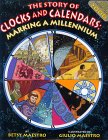|
nancy@nancykeane.com
|
 |
Maestro,
Betsy
THE STORY OF CLOCKS AND CALENDARS
: MARKING A MILLENNIUM
New York : Lorthrop Lee &
Shepard, 1999
IL 3-6
ISBN 0688145485 |
| The
year 2000 will be a year-long celebration of the start of a new millennium,
which really begins on January 1, 2001! This book is a great resource
for learning about the passage of time and how people have kept track of
it in various parts of the world. Early calendars did not always
match the seasons, so people had to keep adding extra days to make the
calendar more accurate. In 46 BC, for example, Julius Caesar added
80 days to the Roman Calendar, so it had 445 days that year. It became
known as Annus Confusionus - the Year of Confusion. Nineteen years
later, the calendar had to be adjusted again, because Caesar had made a
mistake in his calculations. The emphasis of the book is on the Georgian
Calendar, started by Pope Gregory XIII in 1582, since this is the calendar
most people use today. But the Maestros give easy-to-understand text,
diagrams, and illustrations about other calendars too. Reading this
book will be a fun way to learn about time, and to celebrate the year 2000.
(Jeannie Bellavance
bellavance@erols.com.
for
Pennsylvania
Young Reader's Choice Awards) |
|
SUBJECTS:
History -- General
Two thousand, A.D.
Clocks
Calendars
Millennium |
© 
Permission is granted for the
noncommercial duplication and use of this resource, provided it is substantially
unchanged from its present form and appropriate credit is given.
|
